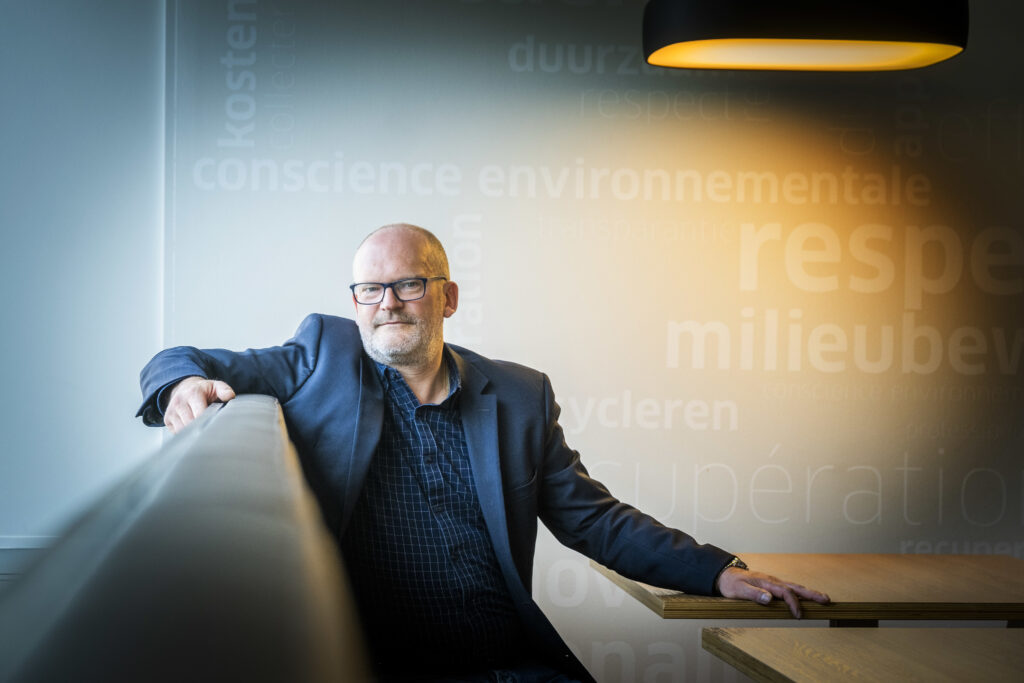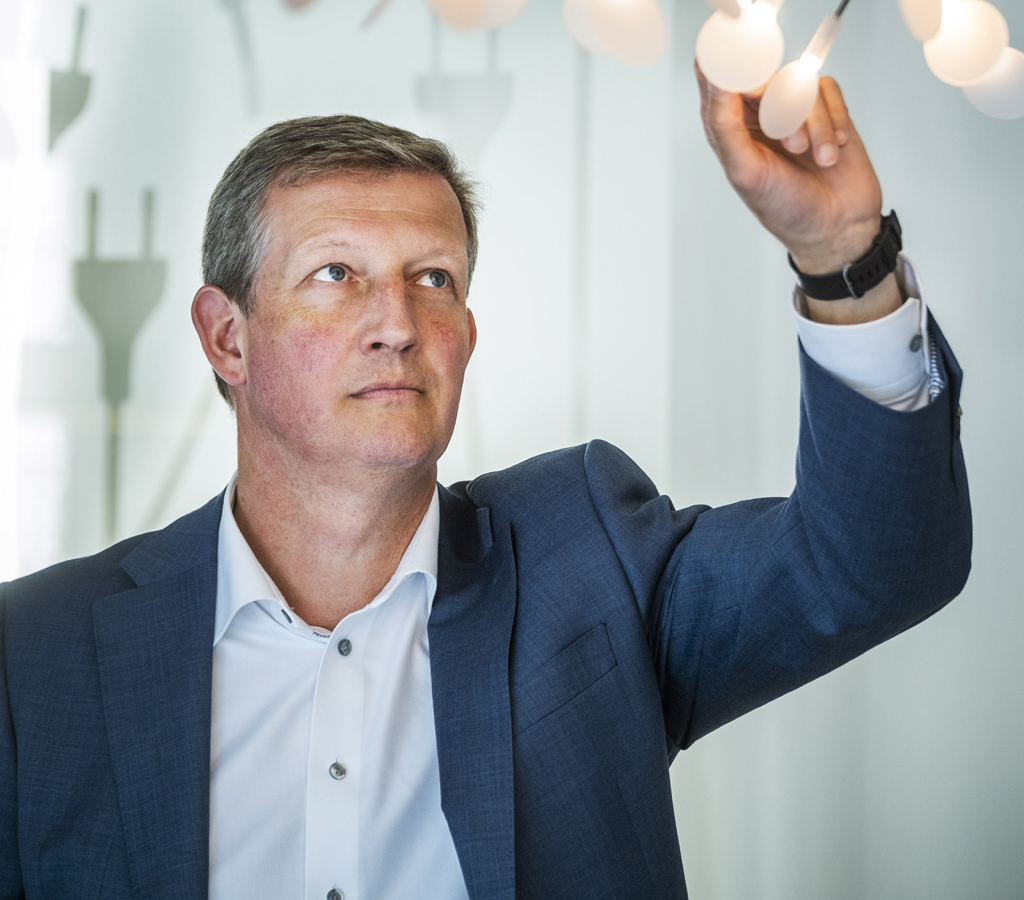“We want to focus even more on reuse and repair”
Following a minor decline in 2022, collection figures in 2023 are back on the rise. With some 127,000 tonnes of electrical appliances and light bulbs, we are back to the levels seen in our record year of 2021. According to CEO Eric Dewaet and Chairman Bruno Vermoesen, increased efforts around reuse and repair are also yielding great results. The new mission, vision and structure have undoubtedly contributed to this.
Bruno Vermoesen: “For me, the key moment of the past year was the introduction of our new structure – a non-profit organisation comprising six subdivisions. Our members – manufacturers and importers of electrical and electronic appliances – were keen to get involved. We are now working within a simpler structure, allowing us to better and more quickly get our message across. This is an opportunity our members have seized with both hands. I believe we have already succeeded in achieving our goal of building real partnerships, and shaping a ‘we’ narrative. For example, we have switched to a fairer, performance-based compensation system for recyclers.”
Eric Dewaet: “We are very happy with the positive feedback from our stakeholders regarding Recupel’s communication and overall partnership approach. At our annual stakeholder meeting, this was commended by those present. Another thing I will never forget: King Filip’s visit to the COMET Group, one of our trusted recycling partners. As well as enjoying a look behind the scenes, the King brought in some old electrical appliances to drop off in a collection box himself.”
Bruno Vermoesen: “Our members are excited to be involved as part of our new structure, which is great to see!”

Recupel has placed even greater emphasis on reuse and repair. Are you already seeing the results?
Vermoesen: “We have made changes that are sure to pay off in terms of extending the lifespan of used electrical appliances. In that respect, we can also reflect positively on our new mission and vision, which are clearly rooted in repair and reuse. Society is constantly evolving, and Recupel is evolving with it. Take, for instance, legislative initiatives such as the European Green Deal. This year, we’re also pushing further in the direction of reuse and repair with the establishment of a dedicated working group of manufacturers of electrical devices.”
Dewaet: “Overall, there is noticeably greater interest in reuse and repair. The circular economy is really coming alive. In 2023, we officially included encouraging this development as part of our renewed mission. It’s great to see that’s also yielding positive results. By 2023, total reuse increased by 38%, rising from 4,900 tonnes in 2022 to 6,700 tonnes. These are figures as reported by Herw!n and the RESSOURCES Federation, as corroborated by member and approved recycler figures, too.”
“To promote reuse and repair, we also need to ensure that discarded appliances are handled with care. We refer to this as ‘careful collection’. This starts at the recycling centres, where we partner with Repair&Share to neatly stack appliances on roll cages. Following this, our partners take care of transport, ensuring the appliances are not damaged during transit, either. In this way, by already opting for reuse at source, we can encourage a high quality influx of goods.”
Vermoesen: “We’ve already received a great deal of positive feedback from our second-hand stores, who greatly appreciate our efforts in promoting reuse to the wider public.”
Eric Dewaet: “By already opting for reuse at source, we can encourage a high quality influx of goods.”

Were there any other focal points in 2023?
Dewaet: “Yes indeed. Take recycling, for instance. While we are mainly talking about the percentage by weight that processors are able to reclaim as raw materials, quality is also an important factor. Metals such as copper, aluminium and iron, for example, can be reused fairly easily. Plastics are harder to recycle to the same level of quality. In this field, there is a greater need for interaction between manufacturers, processors, research institutions, and so on.”
Vermoesen: “We should also be thinking about recycled material. The amount of recycled material will be a key element in conforming with the requirements set out by the EU’s forthcoming revamped Ecodesign regulation. Product designers will more than likely be required to use a – yet to be determined – percentage of recycled plastic. For manufacturers, that will undoubtedly pose a challenge. Not only should there be more recycled material on the market, this material needs to be of sufficiently high quality. We are not quite there yet.”
“On a separate note, I also wish to highlight the partnerships that manufacturers and reuse centres are establishing with social economy employers. These are enabling people who’ve been unemployed for a long time to repair appliances for others with small budgets to repurchase. We have spent the last year mapping out Recupel’s entire value chain, from collection and transport to recycling, repair and reuse. In total, more than 60% of employees work within the social economy, accounting for more than 1,000 jobs.”
What does the future hold?
Dewaet: “We are of course looking beyond 2024. To truly engage in the circular economy, we need to acquire greater knowledge about our products. To that end, we are currently trialling a scanning app. We have already had success in a pilot project, scanning and sorting LCD and LED displays via the app. Processors need to be able to separate these two types, as LCD displays contain mercury, and therefore belong in a different recycling stream. Moreover, using the scanning app, we hope to gather useful information about the collected appliances, such as age and repair history. This can provide an indication of whether a particular appliance is still suitable for reuse. We expect that it will become more important to inform people on an individual basis about where they can take their discarded appliances. The more we know, the more we can contribute to the circular economy.”
Our new vision
Together with consumers and partners, Recupel is creating a sustainable and circular society by collecting electrical and electronic appliances and light bulbs to give them a new lease of life.
Our new mission
On behalf of manufacturers, Recupel collects and processes used electrical and electronic appliances and light bulbs. Working with a wide network of partners, we encourage repair and reuse and organise high-quality recycling. That way, together we reduce our consumption of raw materials and energy.